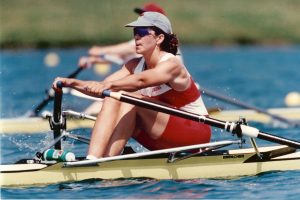The hardest part of any task is starting.

Every time the Olympics come back on TV I end up calling my rowing partner Kathleen Heddle, or she calls me. How did we do that? How did we win at the Olympics? And… how the heck did we win 3 times, becoming Canada’s most successful Summer Olympians? I always thought of Olympians as superheroes, and I know I’m no super hero. I can’t speak for Kathleen, but for myself – I know all of my faults and weakness. I never ate, hydrated or rested like I imagined an Olympic Champion should have. I never liked stretching; still don’t. But we did win. Winning – winning 12 World and Olympic titles, countless World Cups and other rowing races started somewhere. Being a career champion started somewhere.
Growing up, I was always a competitor – but I wouldn’t claim to be a winner. I played lots of sports, but I wasn’t talented at any. I was lucky to find rowing; because I saw it in a TV ad and in a movie I looked up a local rowing club in a phone book (that’s Google now <wink>). Wow. I loved it. Turns out I have natural “water feel”– and sitting on my butt, going backwards, and really physically suffering over and over again was something I could sink my teeth into. But being comfortable winning, winning big important races? That was still foreign to me, that was scary.
Until Kathleen told me it scared her too. That changed everything.
In 1991 Canada hadn’t won a medal at the World Championships for years. European crews actually felt pretty safe (lucky?) when they drew Canada in their race; but Kathleen and I (and the rest of our team) felt we had the potential to change that. But potential means nothing at a finish line and we had learned the year before– we’d had real potential to win bronze at the World Championship bronze but went home a disappointed fourth. Gutted.
Before the 1991 Worlds, our season would start in Lucerne. For rowers, the Lucerne World Cup is traditionally the biggest World Cup race of the calendar year. Because each event can include multiple entries from countries, some would say that it was harder than the World Championships. I recall the night before those finals so clearly. That day, in the semi-final for the women’s pair, Kath and I had defeated 4 of the top 6 seeded crews including the 1stand 2ndseeds. The talk around the regatta was that we would win the final the following day. That was pretty heady stuff.
I remember lying in bed trying to sleep. In the darkness I spoke to Kathleen across the room, who was also unable to sleep. “We beat everyone today”, I said with a can-you-believe-it tone. Kathleen is a quiet person at the chattiest of times, eventually her reply came “I know.”
“We could win this tomorrow,” I said. Again, a thoughtful pause and she said “I know.”
I thought about my next comment. I knew what I wanted to say… but sometimes saying a thing, admitting to a thing makes it real, makes it a bigger problem then you want it to be – but I whispered it anyway…. “I’m scared”.
What had I done? What had I said! I had admitted to fear! Did this make me weak when she needed me to pretend that I was strong?
In the dark, she finally replied, “Me to.”
Her “Me to” changed everything. If Kathleen Heddle, the person who I trusted more than anyone, the most talented athlete/rower that I knew – if Kathleen Heddle was scared then being scared must be normal. I didn’t worry about my fear after that, I embraced it. I allowed it to be present, in concert with my confidence. After that I slept well. And in the morning – we started to win – a lot.
Now, I have the honour of being the Chef de Mission of the 2020 Canadian Olympic Team, and that moment, when Kathleen normalized the fears and doubts that came with my ambitions – that moment is what I want to share with Canada’s team.
Tokyo will be my 10thOlympic Games. I went to 3 as an athlete, 2 as media and this will be my 5thin a mentoring type role. I’ve worked with Winter and Summer Olympians, rookies and veterans. There is no one athlete, sport culture or path to the podium that is the same, but the emotional rollercoaster that our ambitions take us on is a shared experience.
The Canadian Olympic Team chooses to embrace “Be You” as a value statement. We perform at our best when we are treated as equals and are empowered to be our authentic selves. This refers to our social and cultural self – as well as the powerful emotions that come with believing in extraordinary goals. Part of our authentic self is accepting that fear and doubt are as normal a part of our path as confidence. The presence of fear doesn’t make us weak; it shows us that we have assigned great value to our goal, that we care. I want us to be comfortable caring more, not less. Capable of doing more, not less.
In Tokyo – and as importantly in the build-up to those Olympic Games – I hope to fill whatever role our Team Canada athletes need; mentor? mascot? It’s up to them, it’s their Games. I also hope that I can help them realize that it’s ‘normal’ people like them, like us, who achieve incredible things.
Train hard enough to be confident, care enough to have fear; start a career of winning somewhere.

